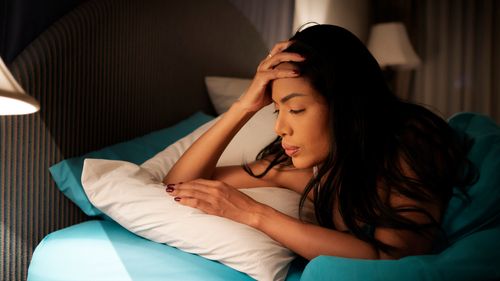 There are many things that can affect your mental health. Some issues are chemical, and others are exacerbated by factors such as the state of the world or personal stressors. Sleep anxiety can be brought on by a myriad of triggers that you can't always control. What you can do is learn how to manage the anxiety that keeps you from falling or staying asleep so that you can get better rest. In addition to guidance from your counselor or therapist, here are some tricks you can use to make this nighttime problem occur less frequently.
There are many things that can affect your mental health. Some issues are chemical, and others are exacerbated by factors such as the state of the world or personal stressors. Sleep anxiety can be brought on by a myriad of triggers that you can't always control. What you can do is learn how to manage the anxiety that keeps you from falling or staying asleep so that you can get better rest. In addition to guidance from your counselor or therapist, here are some tricks you can use to make this nighttime problem occur less frequently.
Know Your Triggers
Any concerns that keep running through your mind when it's time to go to bed can keep you from falling asleep. Your own triggers may not be part of your conscious thoughts, though. If that's the case, try to notice patterns in your behavior that lead to anxiety-induced insomnia. Does it occur after conflict or when you have had a particularly difficult day? How much news did you view or read on the days when the problem seems the worst? Understanding what prompts worry that keeps you awake can help you identify the problem faster.
Stay Away From Social Comparison
It's good to have healthy, clear standards for yourself. When you get upset that you're not meeting expectations that are based on what other people need or do, you are likely erring on the side of unreasonable. Just because your friend has a simple bedtime routine that allows them to finish up their days and fall asleep within 30 minutes, that doesn't mean it's a good plan for you. There's nothing wrong with needing to set aside extra time to wind down. Don't let social comparison shame you out of a workable solution.
Have a Nighttime Exercise Routine
Sometimes anxiety shows up as nervous energy. If this is how it manifests for you, exercise can be a practical way to deal with it. While many people prefer to work out in the morning, it may make more sense for you to do so when you already have excess energy stored up. Save your daily run for the evening, or practice yoga or Pilates to relax your body through movement.
Find Soothing Rituals That Work for You
Another reason you may need to lengthen the time you spend winding down is to allow yourself room for soothing rituals without feeling rushed. There are many ways to quiet your mind and body and prepare them for rest:
- Deep breathing exercises
- Meditation
- Warm baths
- Aromatherapy
- Calming music
- Journaling
- Prayer
The rituals that relax one person may not be as effective for someone else. Therefore, it's important that you experiment with different options until you find the ones that work best for you. Embrace these practices each night until they become a habit, and you are likely to see your sleep anxiety decrease.
Create a Calm Environment
Finally, you can address insomnia induced by anxiety by creating a safe, calm space that is conducive to good sleep. After all, no matter how relaxed you are, a lumpy, uncomfortable mattress or an unpleasant temperature can still keep you awake longer than you intend. A weighted blanket and soft, subtle lighting can also calm anxiety. If possible, avoid clutter or anything that can distract you from sleeping in your bedroom. The calmer the environment you can create, the easier it is likely to be to fall and stay asleep.
If sleep anxiety is robbing you of the rest you need to function throughout the day, the first step is finding a professional who can help you get to the root of the issue. However, there are also things you can do to address the problem. Following these tips may be able to relieve some of the effects of your nighttime stress.



